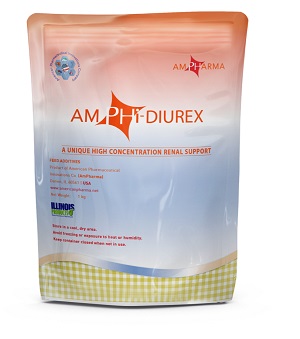AMPHIDIUREX
Last Updated: Friday, February 3, 2023

A Unique High Concentration Renal Support and Diuretic, Water soluble Powder, for Calves and Poultry
Ingredients
VITAMINS: Vitamin B1 (Thiamine HCl), Vitamin B2 (Riboflavin Sodium Phosphate), Vitamin B6 (Pyridoxin HCl), Vitamin B3 (Niacin, Nicotinic Acid), Vitamin C. MINERALS: Potassium, Sodium, Magnesium. Ammonium Chloride, Colloidal Silica, Sorbitol, Dextrose
Product Description
- AMPHIDIUREX powder is a unique, high-concentration formula that contains 99% active ingredients specifically formulated to work in tandem to help maintain renal and hepatic health.
- AMPHIDIUREX powder is a potent diuretic, thanks to its high content of Ammonium Chloride, Magnesium Sulfate and Sodium Sulfate in a scientifically balanced blend that acts synergistically to help excrete toxins through the kidneys and improve renal functions.
- AMPHIDIUREX powder helps prevent the formation of renal calculi and renal edema.
- AMPHIDIUREX powder aids in improving liver function by increasing bile secretion, aiding to the increased hepatic activity and functions in neutralizing toxins and prevention of fatty changes of the liver. It helps in excreting and eliminating toxins of both renal and hepatic sources.
- AMPHIDIUREX powder helps decrease urine pH, which acts as a disinfectant to the urinary tract, inhibiting the breeding of pathogenic bacteria.
- AMPHIDIUREX powder helps effectively in improving the overall performance of birds and animals by supplying all water-soluble vitamins and helps absorption of fat-soluble vitamins through its high content of sorbitol.
Product Benefits
- AMPHIDIUREX powder can be used in prevention and combating of the following:
- All kinds of fungal, bacterial, and viral infections that produce harmful toxins.
- Multiple mycotoxicosis.
- Kidney and liver stress conditions.
- Renal and liver failure.
- Urolithiasis.
- Visceral and renal gout.
- Acute toxic nephritis.
- Renal necrosis.
- Immune stress and deficiency conditions.
- Ill effects of pesticide residue.
- Increased protein and calcium content in feed.

